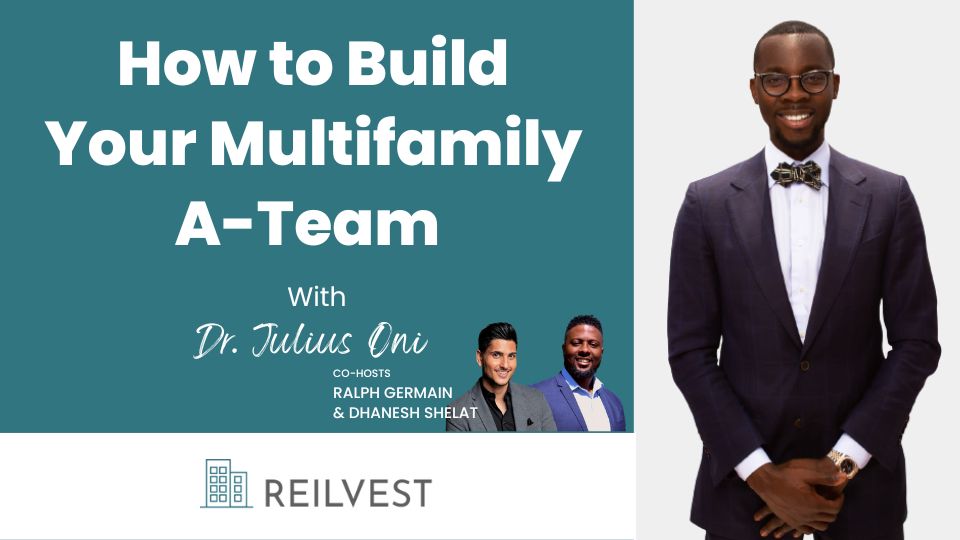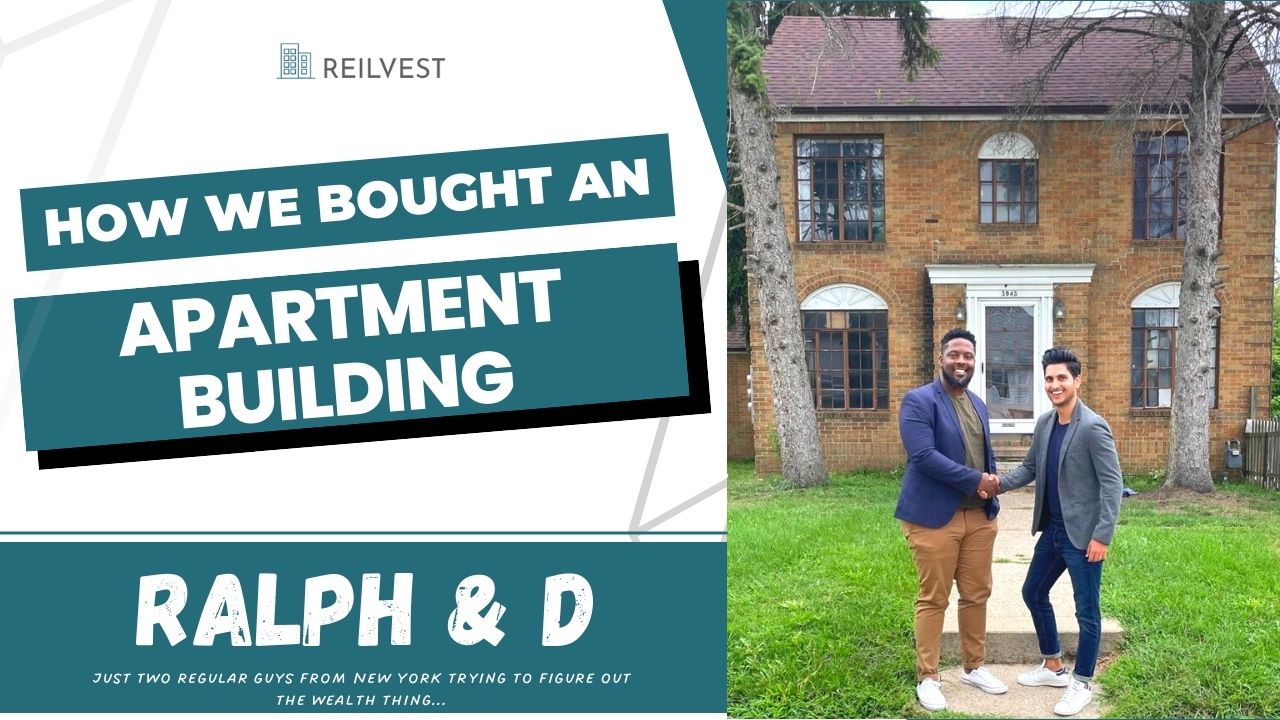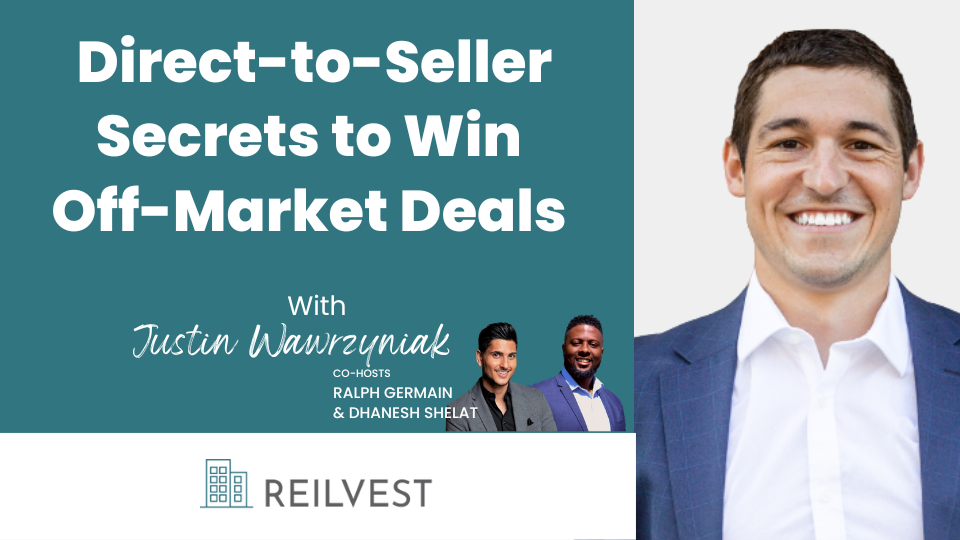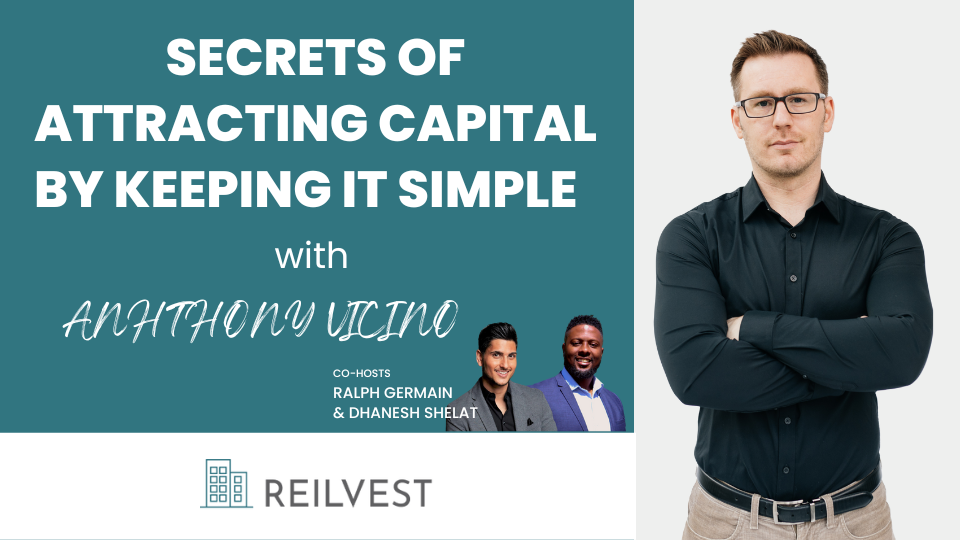Julius is the CEO and co-founder of XSITE Capital Investment LLC. Prior, Julius’ investment focus was single-family real estate and angel investing. Over the past several years, Julius has invested in over 50 start-ups and currently sits on the advisory boards of four healthcare-related start-ups.
Julius and the XSITE Capital team host a rapidly growing multifamily-focused meetup in Maryland where they provide resources and add value to individuals interested in growing their wealth and changing their financial future.
Check out the interview with Julius here:
KEY TAKEAWAYS:
-
- You cannot save your way to wealth.
- Know yourself first before you look for a partner.
- Find partners that have complementary strengths.
- Make sure your partners have SHARED core values.
- Intensity is nice, but consistency is key.
TRANSCRIPT
- Dhanesh: All right, Ralph, who do we have this morning?
Ralph: All this morning, very excited to have Dr. Julius Oni with us today. I’m going to read his bio and we’ll get started. Julius is the CEO and co-founder at Xsite Capital Investments. Prior to Julius’s investments, his investment focus was single-family real estate and angel investing. Over the past several years, Julius has invested in over 50 startups and currently sits on the advisory board of four healthcare-related startups. Julius and the Xsite Capital team hosts a rapidly growing multifamily-focused meetup in Maryland, where they provide resources and added value to individuals interested in growing their wealth and changing their financial future.Within the last two years, he led the acquisition of Xsite Capital’s fast-growing portfolio of more than $125 million. He was also acknowledged as a Forbes Business Council member in 2021. Julius works as an orthopedic surgeon in Baltimore, Maryland with a subspecialization in hip and knee replacements and was voted Top Doc for Joint Replacement by Baltimore Magazine for the last three years running. He is also a husband and a father of two beautiful daughters. His interests include travel, music, global health, and spending time with family. Multifamily Breakfast Clubbers, welcome to our meetup with Dr. Julius Oni. Welcome, Dr. Julius.Julius: Thank you. Thank you so much. Really means a lot to me.Ralph: So good to have you.Julius: Yeah, thank you. Thank you. It’s good to see your faces, and thanks for the opportunity to speak on your platform and get to interact with all these fantastic people here.
Ralph: Yes. And what an incredible bio and very busy life you lead. Dr. Oni, right now is in Atlanta, performing due diligence on a property they’re getting ready to close on and flying back tonight or tomorrow back to DC. So thank you for carving out some time for us today to talk to us.
Julius: Definitely. It’s always a great pleasure to interact with like minds. I get a lot of inspiration from groups like yours because I think we can all, iron sharpening iron. Right? So I’m going to be learning a lot from you today. And hopefully I could drop a little bit of value for you guys, too.
Ralph: Absolutely. Well, why don’t we start with, tell us a little bit about yourself. I know I read a short bio there, but let’s go in a little bit deeper. Tell us a little bit about yourself, and how you got started in multifamily investing.
Julius: Oh, awesome. Awesome. So yeah, one thing the bio left out was that I’m in my 10th year of practice as an orthopedic surgeon. And for the first five years, really of practice, I was mostly focused on just becoming the best orthopedic surgeon I can be. I could. And that’s exactly what I did. I focused and tried to master my craft, and develop a great reputation in our community of orthopedic surgeons. I was able to ultimately be recruited by one of the top institutions in the country. I was doing close to 500 surgeries a year. So business was booming, but it certainly was booming for the hospital. And not necessarily me. I mean, it was booming slightly for me too, but it was a great way to build your reputation and to build a career. And at some point, I started to think. I started to read a little bit more about creating legacy wealth. And one of the things I quickly realized is that you cannot save your way to wealth.
And another thing I quickly realized at that point was that even as an orthopedic surgeon, making six figures, maybe high six figures, I was still just a highly paid skill worker. And I couldn’t pass that, my skill work down to my progeny as a legacy. What I was going to be able to pass down was going to be some form of asset, something that can continue to grow over time. So I started to explore what options existed there. And very quickly, real estate came up. So I started in the form of single family real estate. I thought I was going to buy one single-family home for the next 30 years and eventually maybe have a nice little portfolio and sell the entire portfolio. And that would be my nest egg.
Well, I forayed into that. I quickly realized that the cash flow wasn’t what I thought it would be. And I also realized that I was a poor landlord. I hated dealing with toilets, termites, and everything related to antennas. Then I tried to do the property management route, and everything cost so much. Changing a doorknob was 50 bucks, and changing the simplest things was so expensive. So that ended up just taking away the cash flow for the most part. And around the same time, five years into practice, I also started investing in startups. So my younger brother and I started a diagnostic startup that was in between the US and Nigeria, where I was originally from. And that got me into that world. So I started to angel invest. I thought, “You know what, I’m going to invest in over 50 companies, a hundred companies.”
And usually, if you bat to 20% on those, if you get a good return on about 20% of those doses, it makes up for all the rest of your investments. Especially if you hit a unicorn, something that is a 50 to a hundred X equity, multiple. And interestingly, yes, I actually did fairly well. I’m still bad on about 20-something percent of those startups, but there was no cash flow. That was the most illiquid and most high-risk investment you could ever make because you’re actually making those investments, with the expectation that close to 80% of them will be dead and that money will disappear. So it wasn’t until COVID hit that I really started to think seriously about multi-family real estate. So I was home for about three months. And for the first time in my life, my core identity as an orthopedic surgeon was somewhat challenged. Because all of a sudden, this pandemic happened, and we all had to sit at home, and I was limited to just doing virtual visits. And I just completely had a little bit of an identity crisis.
What happens if I am never able to do orthopedic surgery again? What do I have to replace my cash flow so that my lifestyle expenses or my expenses will be taken care of? that my family will be taken care of. So I have to also say that one of my current partners, Leslie Awasom, was also my coworker at my job. He was a CRNA-certified registered nurse anesthetist. So he was putting patients to sleep while I operated on them. So typically when we add a little bit of brick during the day, we’ll talk about business. I’ll talk a little bit about some of the work I was doing with angel investing and single family. And he would talk a little bit about what he was learning in multifamily. And he and my other partner had actually already started at Xsite Capital just a few months before COVID hit.
And they had been trying to raise capital for a particular deal and had not had as great of success at that point. So they had approached me as a potential passive investor in that deal. So I initially, like most of our prospective investors now, just brushed it off and completely tucked the investor deck away and just forgot about it. But then, around COVID, I had nothing to do. So I was just reading random things around the house and found this deck again. And so when I started to read about this deck and the potential for significant cash flow and participation in the profits or the distribution after the end of the business plan, plus the tax benefits of multi-family real estate, I quickly realized that I have to be participating in this asset class one way or the other. And so I started doing a lot of research.
I realized that man, this actually exists. And I started to go to a lot of virtual conferences at that point. So I had to watch videos from other multifamily real estate conferences. And I noticed something, I didn’t see people that looked like me there. I mean, we were few and far in between. I also didn’t see many healthcare professionals represented in this world. I saw a lot of accountants. I saw a lot of lawyers, a lot of MBAs, and business people. A lot of people were just, well, their first degrees and that’s fine. I saw engineers participating. I certainly didn’t see healthcare professionals. And I saw a lot of other ethnicities too. And I just didn’t see the people that looked like me being represented in this world. So I called my now-partners and said, “Listen, I’m not just going to passively invest. How much have you guys invested in this company so far? I’d love to be a partner.”
And we ended up staying on the phone for about four hours. So it’s almost what you can say, a match made in heaven, in multi-family real estate heaven. And we just talked about our goals, our values. And we found that we actually add a lot of mutual values and complementary strengths. So yeah, the next day I wired them the money, and we officially did the paperwork and I was a partner. And four months later, we closed our first deal. Because yeah, I just took on the mantle of capital raising. Since I was able to fall on their knowledge that they have acquired over the last year or two of learning about multifamily real estate, and just focus mostly on what my strengths are. Going into my community, my network, and just saying, “Listen, guys, I’ve discovered this new asset class, go on a trip together on it.” And so a lot of the goodwill, or if you will, relationships I built over the years. I leveraged them at that point to close that first deal. And the rest is history. We could talk about that later in this conversation.
Ralph: I love it. I mean, just in that short question, you’ve given us just so much context already. First of all, I love how four months it took you to do your first deal. A lot of folks, it takes them a lot longer. But I think part of that is what you said about using your partners’ experience to scale faster. You avoid some mistakes. You avoid some pitfalls that normally a newbie would make by partnering with more experienced people that were in the field already. I love how you said too, that you couldn’t save your way to wealth, and you had to find something else. And that’s very important to hear because I’m reading or I’m rereading The Secrets of the Millionaire Mind by T. Harv Eker. And it talks about that. You’ll never be able to work your way to wealth because you’re always going to need time to work your way to wealth.
And you have a limited amount of time. So it’s about finding a way to maximize your income outside of the time you have to invest in there. And I love the story too, how you met your partners. They were coworkers. And that’s one of the things that I think is important to talk about what you’re doing and be vocal about the things you’re involved in because you never know that your next cube over, or maybe a friend or family might be interested in real estate. And they’ve been nervous to take that dive in, and you might be their conduit to go in there. So let’s talk a little bit about that. What would you say is the best way? I feel like yours happened really organically, which is coworkers, people, but what would you say is the best way to build out a team and find partners to work with if someone’s just starting out or just beginning their multifamily real estate career?
Julius: So yeah, I think, yes, I was lucky to find the partners that I did in the way that I did them. But subsequently, we’ve helped other people find partners. And really what I usually say is, you have to know yourself well first before you start looking for a partner. You have to look at yourself deep down and say, “What are my strengths? What are my weaknesses? Am I strong on the operations side? Can I do a bunch of underwriting? Do I understand the numbers well enough? Or am I the person who likes to talk to people and to create relationships?” And so that later person may be the investor relations-type person, who wants to engage with other people. Who wants to leverage their network to pool resources and go after large deals. Or am I the person who just love to go out and interact with brokers and try to get that next deal going, the deal flow?
Or am I the person who loves to just, do I make decisions in a split second or do I like to sit on it and marinate on it? Because once you know yourself and know who you are, then you are able to start identifying folks that hopefully have complementary strengths. So for me, I mean, I have an amazing team in the sense that Leslie Awasom, who’s our co-founder and director of operations, he’s incredible with numbers. And he does not mind underwriting all day. And I mean, we have a nice core underwriting team with Manny Awasom, who is his brother, and also just incredible with numbers. I mean, he does things with the Excel spreadsheet that I’ve never seen done before. And between those two, we can literally underwrite tens of deals within a week. So usually we are underwriting, reviewing about 42 deals, and underwriting at least five of them a week.
And despite them still having their day jobs. So you have to try to find folks with complementary strengths. Tenny Tolofari, my co-founder and director of acquisitions, is the most incredible. He paints the entire Southeast by just going up and down, meeting with brokers, and interacting with them. Staying in front of them, checking with them, engaging in conversations with them. I mean, most of those brokers up and down the Southeast know who he is, because he’s constantly texting them, asking them about their families. And he is just a bulldog. He doesn’t take no for an answer. He gets right into it, he makes decisions and quickly acts on them. And I have my strengths, too, in the sense that I’m able to work on the larger vision of the company, pull in a great number of investors to come together and join their ownership group of our properties, and things of that nature.
So you have to discover that. The other thing is, that you have to have shared values. So when we came together, one of the first things we did was say, “What are our core values?” We came up with honesty and integrity. So that was number one. The growth and abundance mindset. That was number two for us. We wanted to continue to grow, invest in each other’s growth, and help others grow. Three, we wanted to be people of tenacity. We wanted to exhibit a lot of persistence and determination. Four, we wanted to continue to stay humble and grounded. Because it’s easy to start letting your accomplishments get in your head, but we keep each other’s ground, keep each other, stay grounded. And we say, “Listen, maybe this was not the best way to approach that situation. We need to stay humble.” And the fifth thing that we came up with as one of our core values, was that we wanted to be unique.
We wanted to take a different spin on it. We didn’t want to necessarily do the same thing that everybody else was doing. And part of being unique was thinking completely outside of the box. When we try to figure out, “Okay, how do we want to do this?” We’re like, “Oh, what’s everybody else doing? Everybody else is doing this. Well, we are going to do it this way. Everybody else is going after this avatar. No, we are going to go after this avatar. ” And so those five things form the base of our core values. And you have to understand what your own core values are so that you can match up with someone with complementary strengths but similar core values.
Ralph: I love it. I love it. And I love a few things you said there. I asked you about finding the right partner and finding the right team. And the first thing you said was you have to know yourself first. Before you could even start building a team and finding people to work with, you have to be able to know yourself, what are your core values and making sure those align. And then complement, a team that you guys have complementary skills. You can’t have too many chefs in the kitchen. You’re going to need somebody that’s going to wash dishes. If everybody’s a chef, who’s going to keep the dishes clean? You need somebody, the dishwasher’s job, the sous chef’s job of chopping vegetables is just as important as the main chef. And then the other thing that you said is the skills that you guys have, really answer my next question is what helps you scale faster?
If your team can underwrite tens of deals in a week and somebody else because it’s a team of all vision, but no underwriting skills, and it takes you too long underwrite one, you’re not going to be able to make offers as fast as Dr. Oni’s team is going to be able to do, right? And they’re going to beat you like a drum. So I respect that, and I love what you’re adding there. And so it sounds like these help you scale your team fast. What would you say the other side of that? What would you say are some challenges of working with a partner, is working with teams, right? I mean, a lot of the stuff gets eliminated because you guys have the same core values. You guys are working towards the same goals. So that really prevents a lot of small problems from happening. But what are some challenges that arise when working with a team, and how do you address those with your team?
Julius: Yeah. Actually, before I answer that question, there’s another component of the scaling part of the business that I neglected to mention. And that is your next employee, your first employee. So that’s the partner part of things. If it was just us partners, we still wouldn’t be able to grow as fast as we have grown, but we’ve actually had to build onto that and hire what initially was an executive assistant, who has now become our investor relations, associate Braden Heyd. And also we’ve brought on a marketing specialist. We brought on some folks to back us up on the acquisition side and with the underwriting. But before we actually had the team that we have right now, we actually had to go through a couple of different iterations of assistance. We initially did the virtual assistance from the Philippines. That didn’t work out, because the output was just a little too low-quality that we didn’t think that fit what we wanted to present out to the world.
Then we tried a couple of executive assistants. And it’s either they’re lazy or they’re just not honest, or they don’t share some of those core values that we had. And we were quick to fire, slow to hire, but we definitely went through them until we found the person. And eventually what just happened was, we stopped being cheap. We said, “You know what? We are going to find the person that we think is the best fit for this job, and just invest in that spot.” So instead of trying to pay as little as possible for that spot, we went out and got a high-quality person. And it was just been fantastic and phenomenal so far. And it’s helped us scale, and continues to want to grow with us. And so has moved from just an executive assistant to now running our investor’s relations. Same with marketing.
We tried a bunch of agencies that we’re trying to do it the same way as other companies. And we went back to our core values. They would be unique. No, if you’re trying to do the same thing as everybody else, then you could keep it moving. And eventually found somebody in Macey Price. It was just incredible. Understands our vision, understands our core values, and helps us to communicate. It helps us to represent ourselves and understand the voice of the company. And it helps us to communicate that way. That’s one. The challenges, to your point. In any business, that’s going to be some significant challenges because at any point, you have to learn to communicate with each other. That’s one, and you have to understand everybody’s communication style. Second, you have to hold everybody accountable, particularly the leaders. And that can sometimes be a little challenging.
And I always say, intensity is nice, but consistency is key. Intensity is cool, but consistency is key. If you are not able to just do the boring stuff on a daily basis, the really not-fun stuff, you’re not going to be able to deliver the results. Because any one of us can get excited on a weekend or get excited on a weeknight or something like that. But the really boring stuff, the following up with investors, the underwriting deals that don’t look that great, constantly testing and touching in front of the brokers. And consistently trying to think outside of the box and trying to innovate, that needs to continue to go on. And so some of the challenges that we’ve had have been sometimes trying to keep everybody super-excited, particularly in between deals. Those four months sometimes when there’s no deal coming.
And we are just trying to figure out what to do. It seems like we’re doing everything right, but for some reason, the deals are still not penciling. Either they’re not penciling, or we’ve gotten to a few best and finals and it didn’t get the deal. Or we get to even a buyer’s call and still didn’t get a deal to tell us, “You did this. You’re number two.” But you know what? We love number two now, because guess what? We’ve gotten so many deals where we were number two initially, after the buyer’s call, at least two of them now where the number one person ended up just not being able to close. And then it came right to us. That’s how we got our deal in Columbia, South Carolina at 132 unit called The View. That’s how we got Land Bank Lofts, which was just closed in April 2022 in Columbia, South Carolina also. So I’m comfortable when they tell me I’m number two now because I know, you know what? It’s okay. Yeah. It just may come right back.
Ralph: Love it. I love it. I love it. I love what you said there. And I’m going to print that out and post that in my home office. Intensity is nice, but consistency is key. And that’s one thing that you have to realize this is a long-term game, and the ones that are successful are, I always say the ones that can master the mundane, the things that are boring.
Julius: Absolutely.
Ralph: They’re the things that help you become successful. So I love it. I love it. We’re almost out of time here. I wish we had just so much more time. But real quickly, just for the last two questions. One is, what’s the best way for people to get in touch with you? If you want to learn more about what you’re doing, maybe invest with you. What’s the best way for folks to get in touch with you?
Julius: Xsitecapital.com. My email is JuliusOni@XsiteCapital. I’m also on IG. Bone and Real Estate Doctor, and LinkedIn Julius Oni, J-U-L-I-U-S O-N-I.
Ralph: Awesome. Awesome.
Julius: I think Dhanesh and I are friends now on LinkedIn.
Ralph: Yeah. And we’ll have your info in the chat here as well, and we’ll put it on the YouTube channel as well. And then the last question here for you is, what is your favorite book and why? Apart from Rich Dad, Poor Dad, what’s your favorite book and why?
Julius: So, yeah, so favorite book, I have a lot of them. But one that I really, really loved that was transformative for me was Miracle Morning by Hal Erod. That’s the old concept of changing your morning routine. Talking about consistency, just changing it, and starting your day out on a fantastic note. Since I read that book, I’ve gotten to the point where I started to, at least most days, try to do my savers. I usually don’t get to all six things. Silence, affirmations, visualizations, exercise, reading, and scribing, are the six things that you’re supposed to do. But typically, I try to get to the reading part. I do the meditation and exercise, I try to get to. So at least three of those usually help to set my day up for success. Yeah, those are my favorites. I think that’s one of my favorite books, I think.
Ralph: Awesome. I love it. I love it. Thank you so much, Dr. Oni, for taking the time out to meet with us. Really appreciate it. Good luck on your due diligence day today, and hoping it all goes well for you. And appreciate you being with us here today.
Julius: Thank you so much, Ralph. Really appreciate the conversation. I really thank everybody for sticking around and listening. Hopefully, I was able to share some values with you, and valuable insights with you. So I look forward to hopefully getting to know you all better, and maybe we’ll do some deals together in the future.
Ralph: Absolutely. All right, man.
Julius: Awesome. Thank you.
If you’re ready to start your investing journey, we invite you to join the Reilvest Investor Club today!
Disclaimer: The views and opinions expressed in this blog post are provided for informational purposes only, and should not be construed as an offer to buy or sell any securities or to make or consider any investment or course of action.







